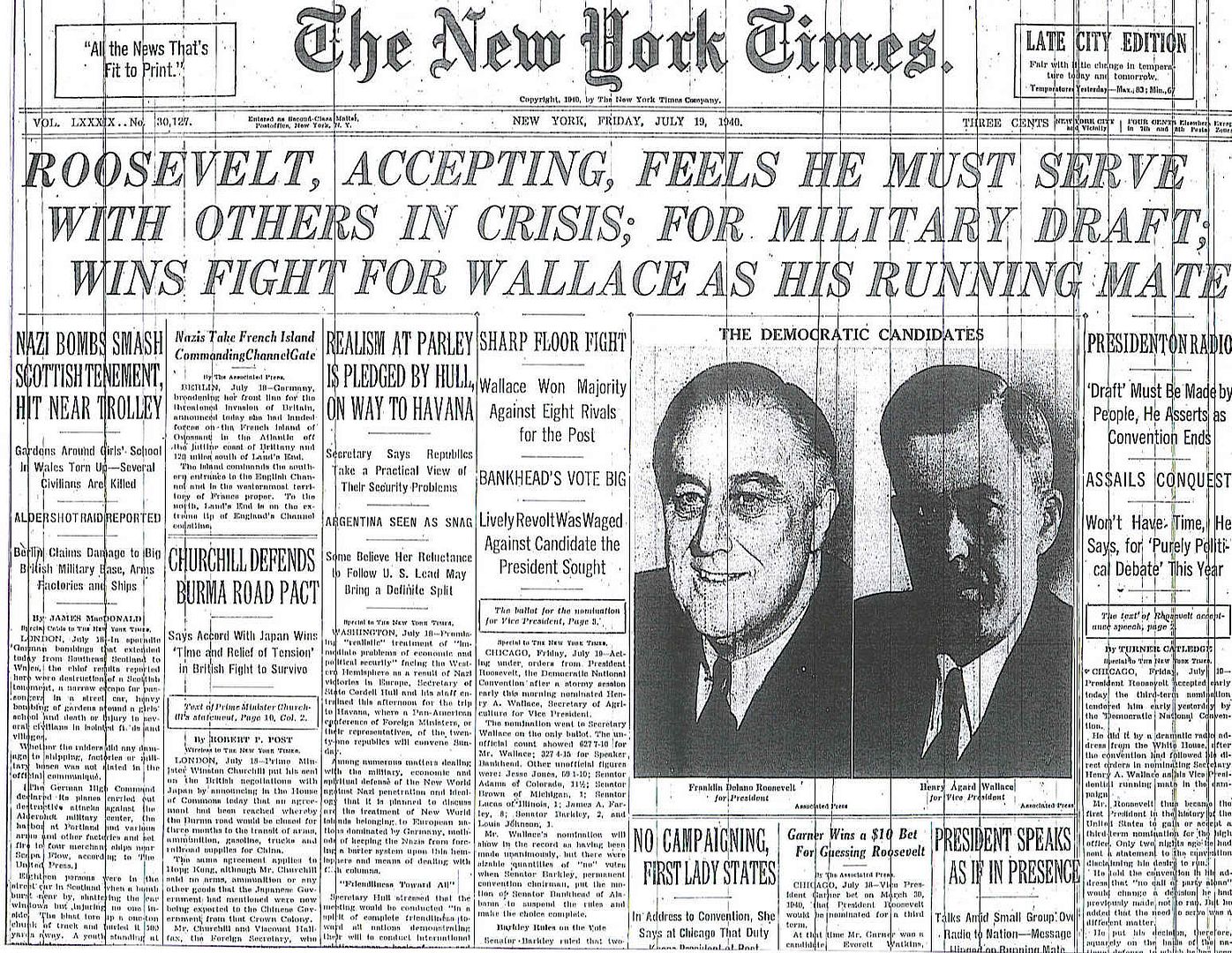
Posted on 07/19/2010 5:20:55 AM PDT by Homer_J_Simpson

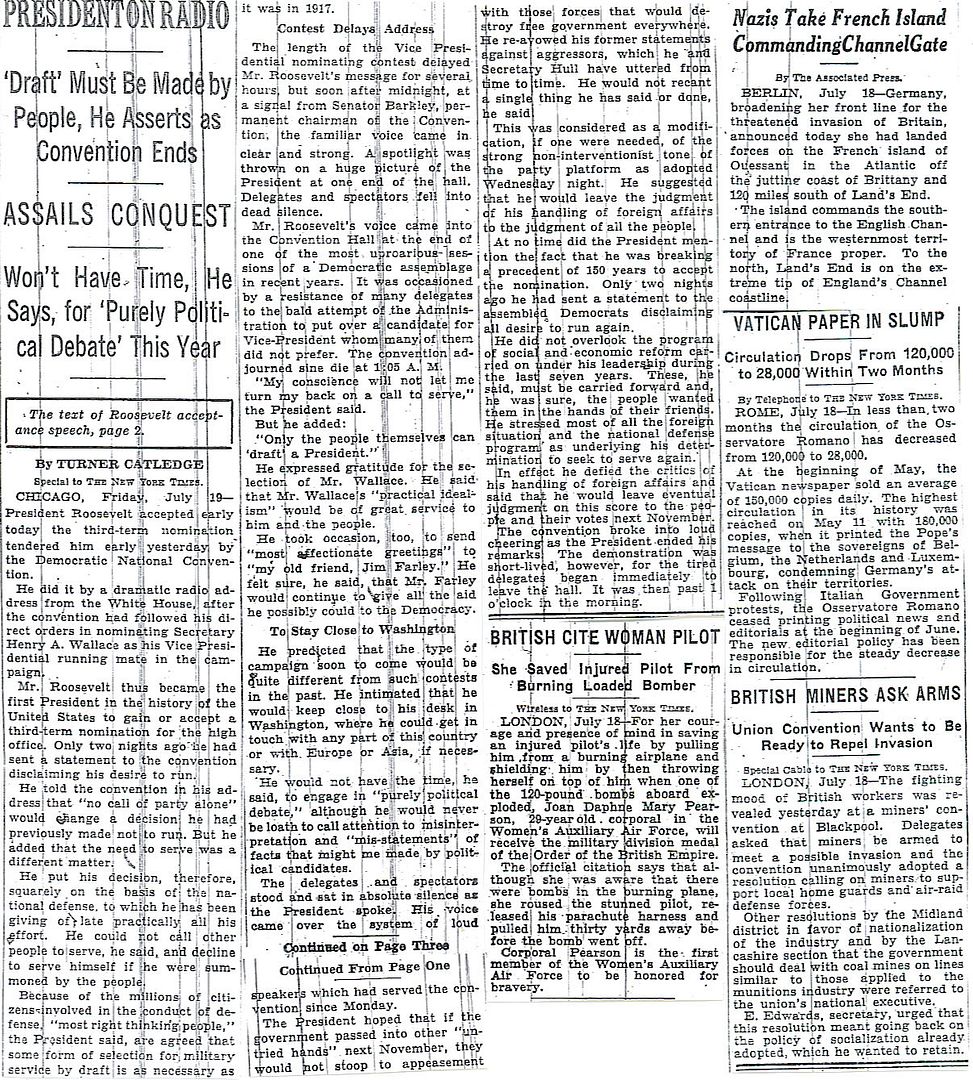
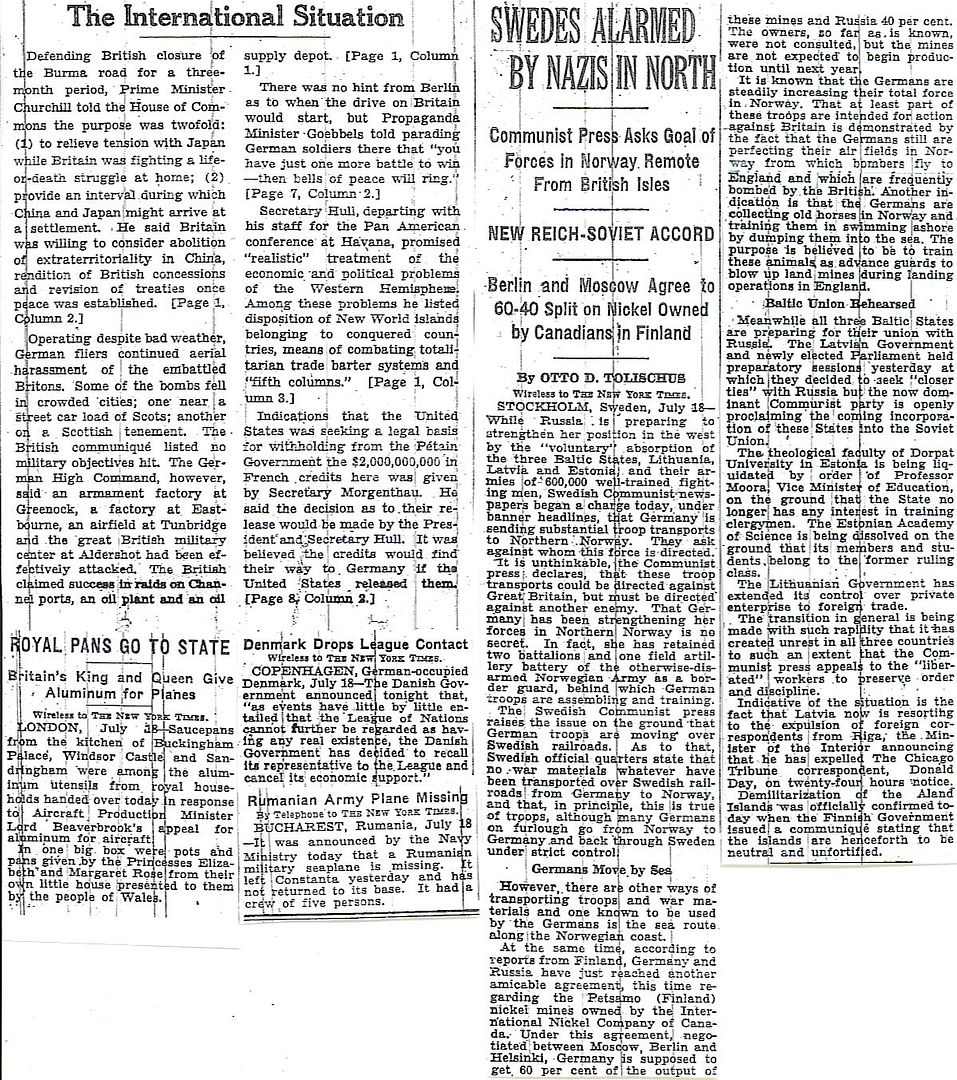
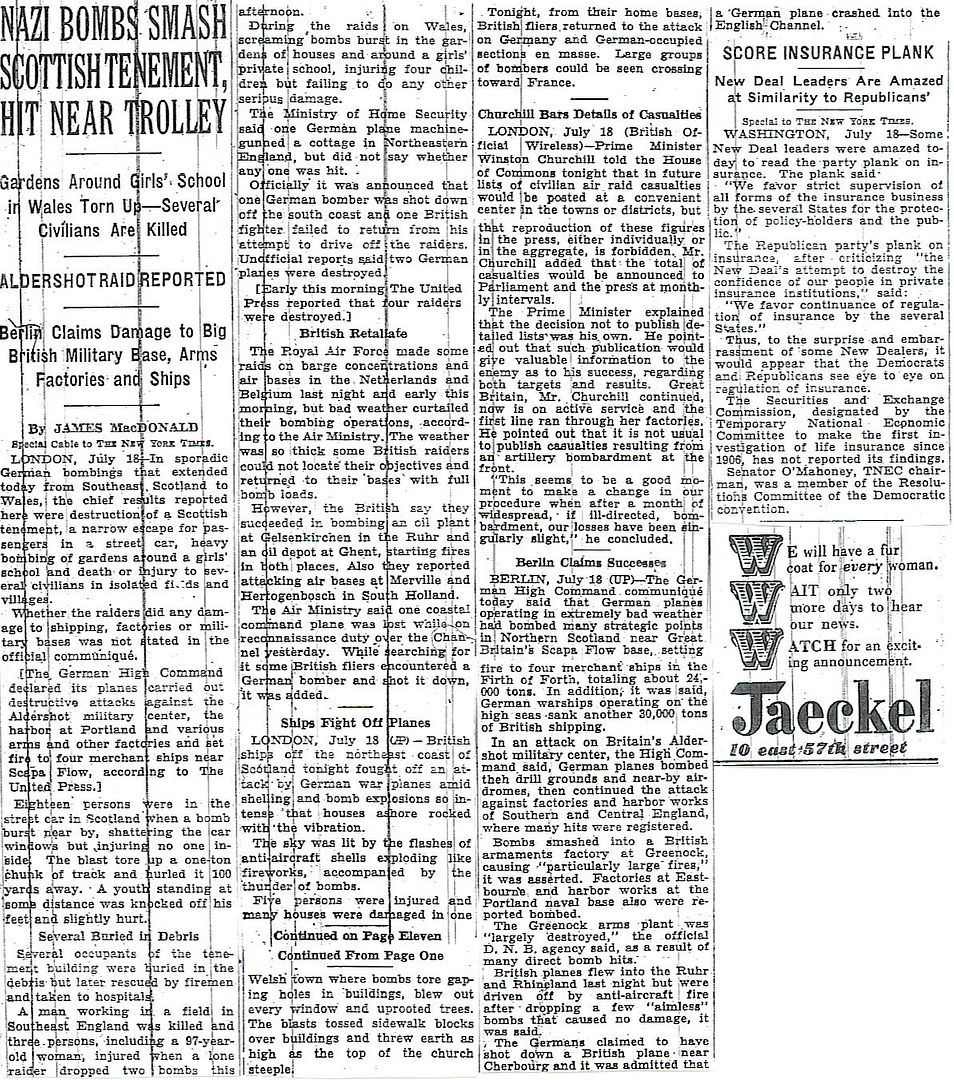
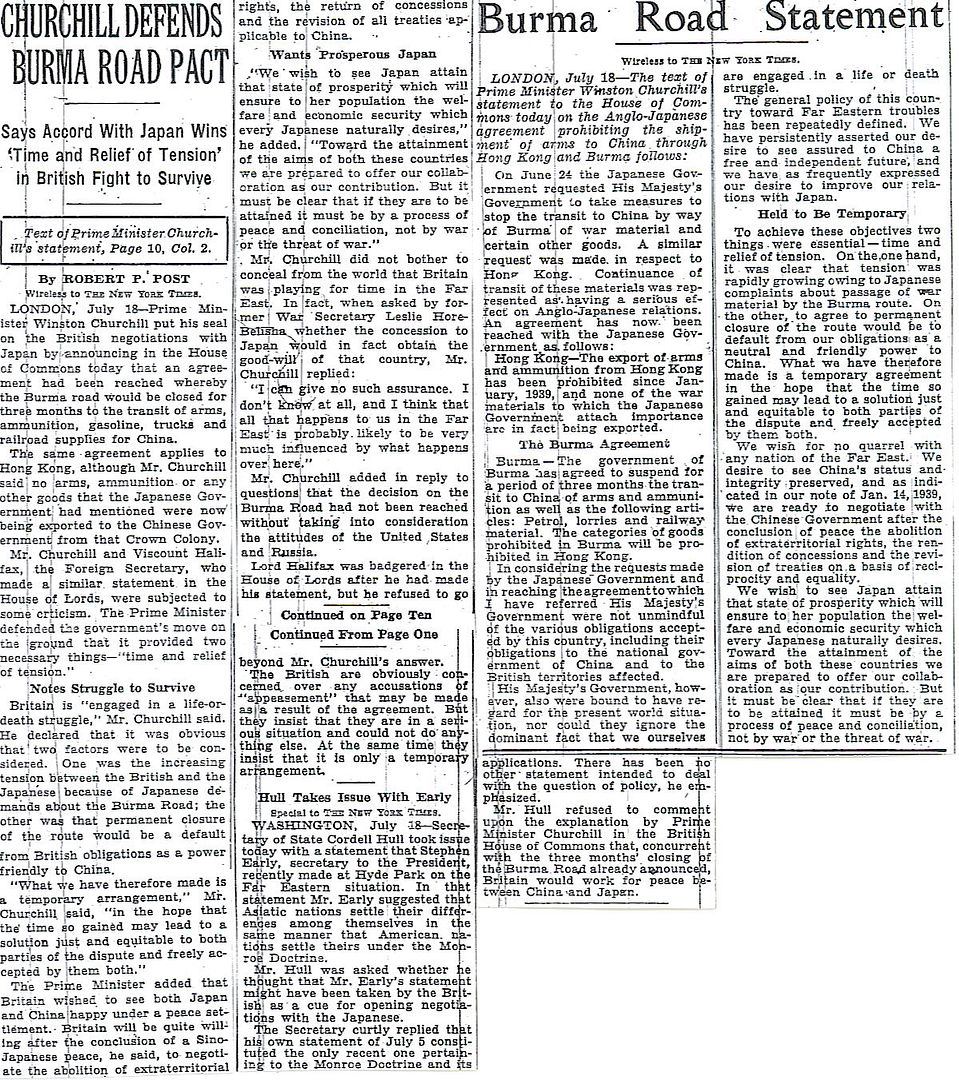
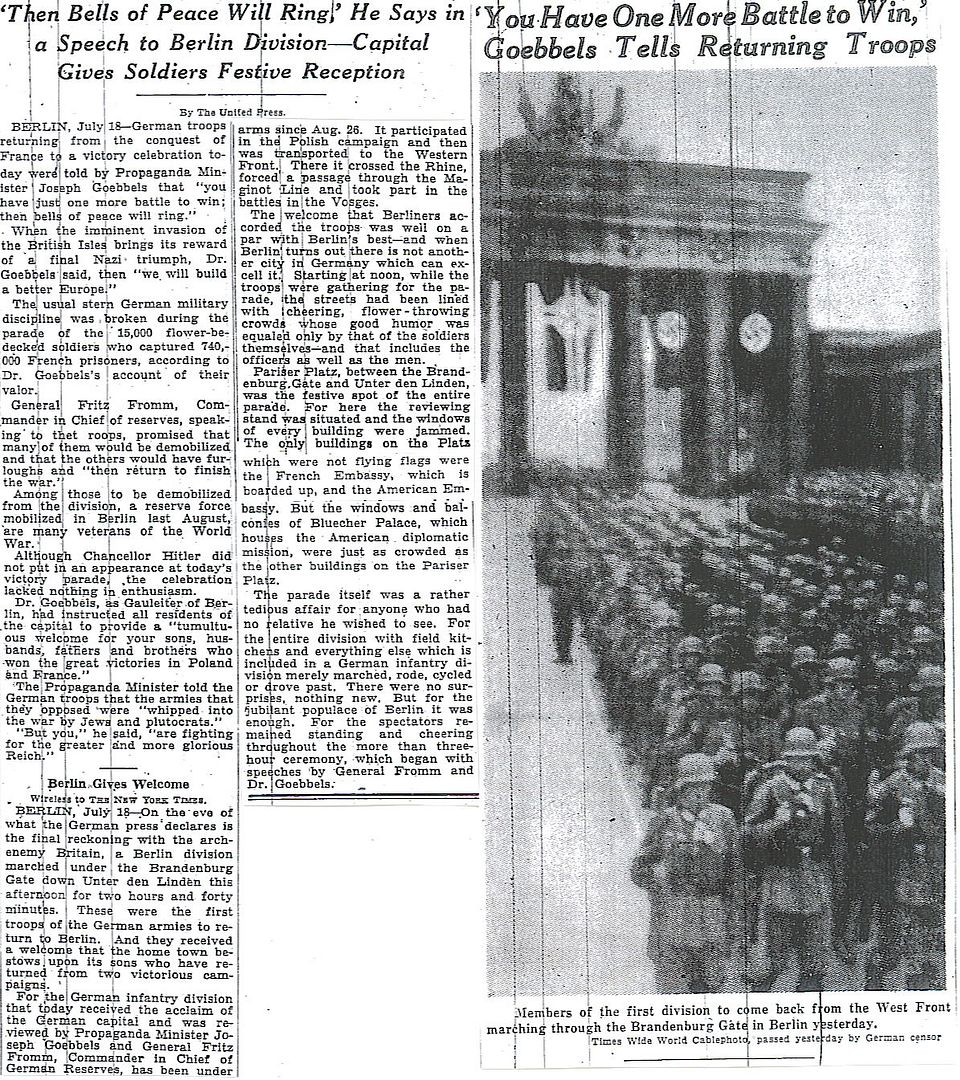
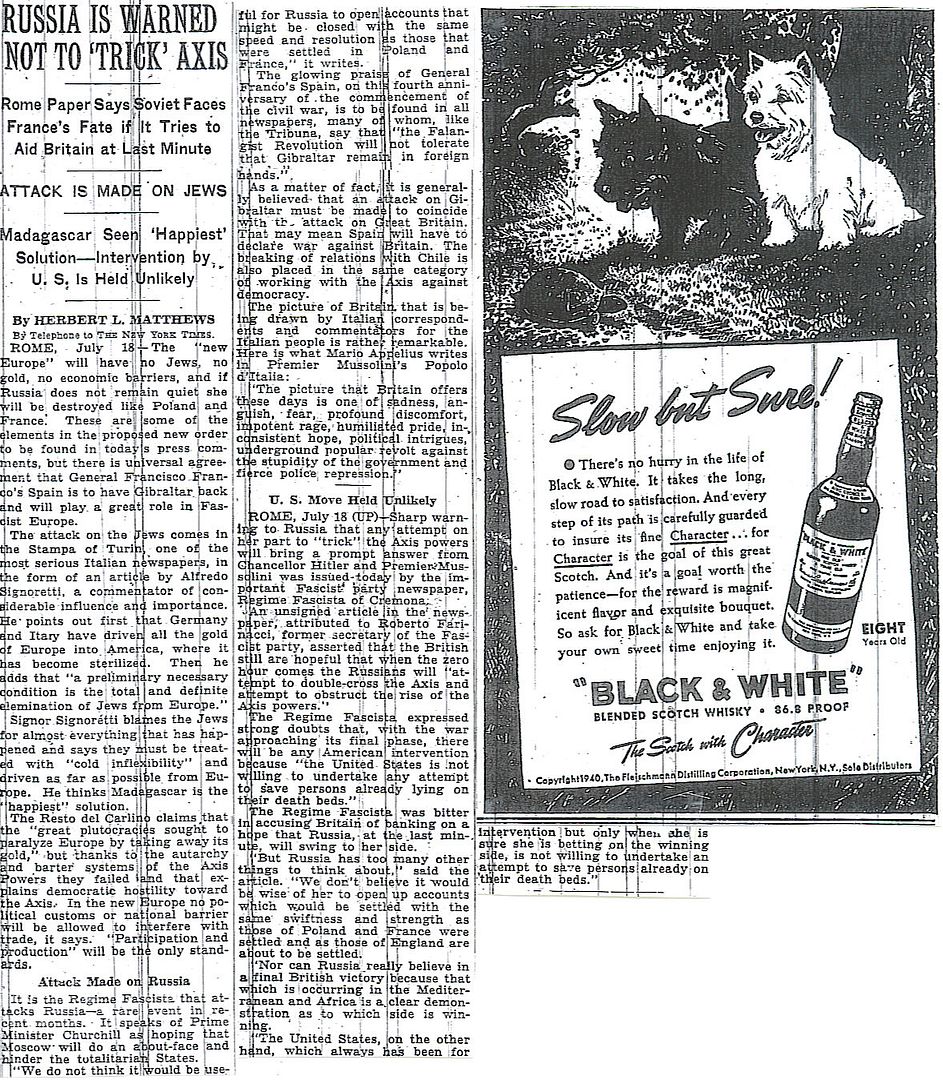
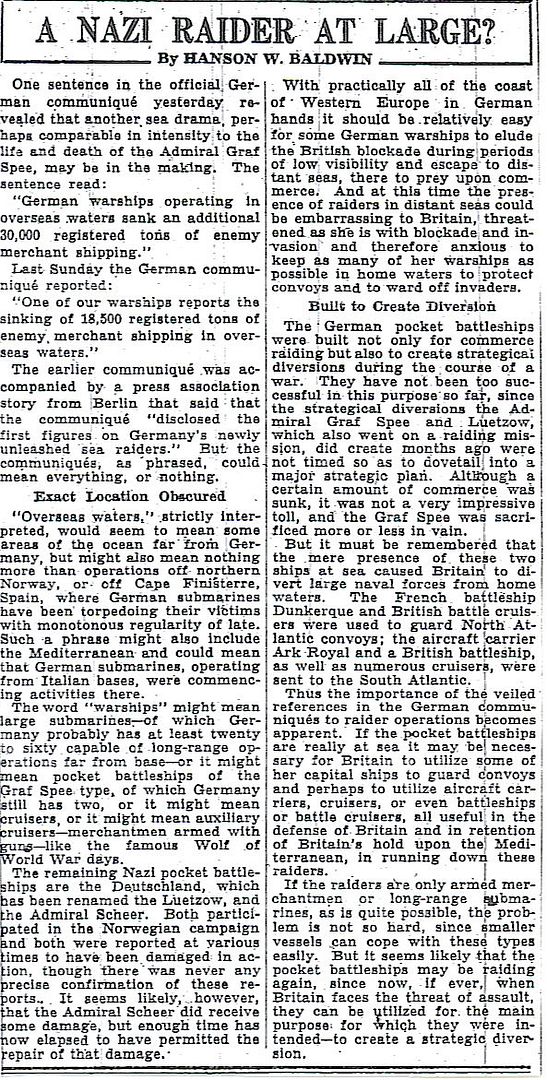
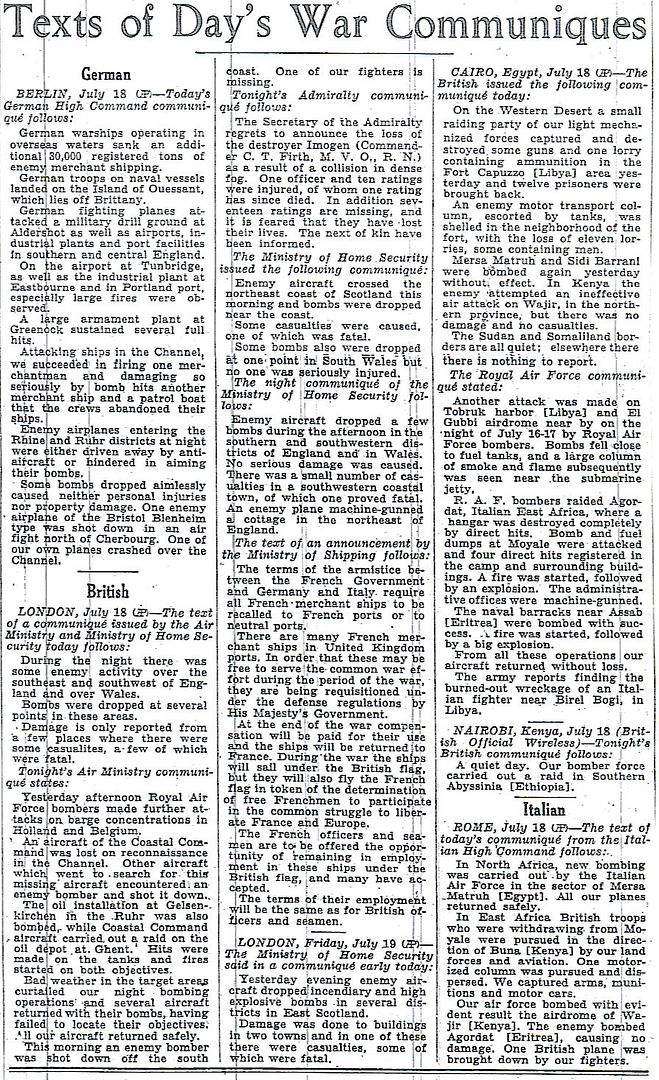
http://www.onwar.com/chrono/1940/jul40/f19jul40.htm
Hitler urges Britain to make peace
Friday, July 19, 1940 www.onwar.com
In Berlin... In a speech to the Reichstag Hitler issues what he describes as “a final appeal to common sense,” urging that Britain make peace.
From London... General Brooke is appointed to be Commander in Chief, Home Forces replacing General Ironside. This is purely an army position and does not give authority over the other services as the title might suggest. Brooke is more of a success in the job than Ironside and produces more realistic plans for dealing with invasion. Ironside is promoted to field marshal.
In Washington... President Roosevelt signs the “Two-Ocean Navy Expansion Act.” This orders construction of 1,325,000 tons of warships and 15,000 naval planes. Including the existing ships, the fleet will comprise 35 battleships, 20 carriers and 88 cruisers.
In the Mediterranean... There is an action between two Italian cruisers and the Australian cruiser Sydney and five destroyers. The Italian Bartolomeo Colleoni is damaged by Syndney and then sunk by destroyer attack. Later Sydney is hit by Bande Nere before the Italians flee.
http://homepage.ntlworld.com/andrew.etherington/month/thismonth/19.htm
July 19th, 1940
UNITED KINGDOM: RAF Bomber Command: 4 Group (Whitley). Bombing - industrial targets and Bremen and the Ruhr.
51 Sqn. Seven aircraft to Gelsenkirchen. One FTR.
77 Sqn. Nine aircraft to Kassel. Two returned early, six bombed. One hit by flak and landed at Duxford.
78 Sqn. Sqn’s first raid of the war. Four aircraft to Ruhr. All bombed. Opposition severe. One attacked by a fighter but not damaged.
102 Sqn. Nine aircraft to oil plant at Bremen. All bombed. Opposition severe, one hit by flak and landed at Bircham Newton.
RAF Fighter Command: One He 111 intercepted over the South Downs - shot down by Hurricane of No.43 Sqn. One Hurricane of No. 1 Sqn. lost - pilot safe.
General Alan Brooke is appointed C-in-C Home Forces, replacing Field Marshal Sir Edmund Ironside who retires, promoted to Field Marshal.
In the Second Supplement to the London Gazette ( Gazette Issue 34902 published on the 19 July 1940)
The King is pleased to make known the following:
REGULAR ARMY.
Gen. Sir W. Edmund Ironside, G.C.B., C.M.G., D.S.O., Col. Comdt. R.A., A.D.C. Gen. to the King, to be Field-Marshal, 20th July 1940 (supernumerary to establishment).
COMMANDS AND STAFF.
The undermentioned relinquishes his appt.:
F.M. Sir W. Edmund Ironside, G.C.B., C.M.G., D.S.p., Col. Comdt. R.A., A.D.C. Gen. to the King, as C.-in-C., Home Forces.20th July 1940 The undermentioned appts. are made:
Gen. The Visct. Gort, V.C., G.C.B., C.B.E., D.S.O., M.V.O., M.C., from C.-in-C C., B.E.F., to be Inspr.-Gen. to the Forces for Trng. .20th July 1940 Lt.-Gen. Sir Alan F. Brooke, &.C.B., D.S.O., Col. Comdt. R.A., from G.O.C.-in-C., Southern Comd., to be C.-in-C., Home Forces, and is granted the actg. rank of Gen..20th July 1940 Lt.-Gen. C. J. E. Auchinleck, C.B., C.S.I., D.S.O., O.B.E., from a Comdr., to be G.O.C.-in-C., Southern Comd. 20th July 1940. (Daniel Ross)
The first prototype cavity magnetron is delivered to TRE — the British radar research centre — near Swanage, on the south-west coast. (Cris Wetton)
Corvette HMS Kingcup laid down.
Submarine HMS Umbra laid down.
Corvette HMS Bluebell is commissioned.
Corvette HMS Picotee launched.
Submarine HM S/M P-611 is launched.
Minesweeping trawler HMS Crestflower bombed and sunk off Portsmouth. (Dave Shirlaw)
GERMANY: Hitler issues a “Last Appeal to Reason”, urging Britain to make peace; he also promotes 12 generals to field marshal, including von Brauchitsch, Keitel, von Rundstedt and Kesselring; he gives Field Marshal Göring the new and unique title of Reichsmarschall.
Oberstleutnant Ramcke is transferred to the 7th Flieger Division.
DENMARK: The government withdraws from the League of Nations.
MEDITERRANEAN SEA: Action off Cape Spada - Off Cape Spada at the northwest tip of Crete, ‘Bartolomeo Colleoni’ is stopped by HMAS Sydney’s gunfire and finished off with torpedoes from the destroyers. ‘Bande Nere’ manages to escape. HMAS Sydney and destroyers HMS Hasty, HMS Havock, HMS Hero, HMS Hyperion and HMS Ilex on an anti-submarine sweep into the Aegean north of Crete. Collins, SYDNEY’S captain, in his narrative of the action, states that SYDNEY, with HAVOCK in company, was to support the destroyers. In addition SYDNEY was to make a sweep of the Gulf of Athens for enemy shipping. As these two missions could not be carried out simultaneously Collins chose to support the destroyers. No special course changes were made indicating a deviation from the designated mission. The meeting of the Italian cruisers and the destroyers which precipitated the Cape Spada action was quite by chance. Collins makes no mention of any report of the Italian ships. (Ric Pelvin)
U.S.A.: Washington: Congress today passed the bill asked for by President Roosevelt to pay for a “two-ocean” navy. The House of Representatives approved a bill appropriating an additional $4 billion to build enough warships to enable the US to confront the danger of war with Germany and its allies in the Atlantic, and simultaneously with the Japanese in the Pacific. There will be an additional 1,325,000 tons of warships and 15,000 naval aircraft. The US fleet will then number 35 battleships, 20 aircraft carriers and 88 cruisers.
It will talk six years for the new ships to be ready. But by 1947 the US Navy will have 701 ships, as against 369 today. The number of battleships will rise from 15 today to 35 in the future.
ATLANTIC OCEAN: At 1828, the Pearlmoor, a straggler from Convoy SL-38, was hit by one torpedo from U-62, broke in two and sank 62 miles west of Malin Head. 13 crewmembers were lost. The master and 25 crewmembers landed at Gola Island, Co Donegal. (Dave Shirlaw)
http://worldwar2daybyday.blogspot.com/
Day 323 July 19, 1940
Battle of Britain Day 10. 6 British Boulton Paul Defiants (”turret” fighters with no forward-firing guns) of 141 Squadron, covering a convoy off Folkestone, are shot down by 12 Bf109s (10 pilots and gunners dead, 2 survivors). 3 other Defiants are saved by Hurricanes of 111 Squadron. Defiants will soon be withdrawn as frontline fighters. 3 Hurricanes are lost in various engagements. There are numerous German bombing raids along the South and East coast of England and Scotland (42 civilians killed in Glasgow). 2 British destroyers HMS Griffin & Beagle are slightly damaging and tanker War Sepoy is sunk when Stukas bomb Dover. Overall, Germans lose 3 bombers and 3 Bf109s. http://www.raf.mod.uk/bob1940/july19.html
Hitler makes his “Last Appeal To Reason” speech at the Reichstag, suggesting directly that Britain come to a negotiated peace (translated leaflets are dropped over Britain). “I consider myself in a position to make this appeal, since I am not the vanquished, begging favors, but the victor speaking in the name of reason. I can see no reason why this war must go on.” He is disappointed that backdoor diplomacy has made no progress to avoid an invasion for which Germany is not prepared. He has not reckoned with Churchill’s determination to fight on, in order to secure the Empire and British influence in continental Europe. Hitler also promotes 12 Generals to Field Marshal. Maintaining the ascendancy of the Luftwaffe, Generalfeldmarschall Göring is promoted to Reich Marshal of the Greater German Reich.
Mediterranean. Battle of Cape Spada. 4 British destroyers HMS Hyperion, Hasty, Ilex & Hero encounter 2 Italian high-speed cruisers Giovanni dalle Bande Nere and Bartolomeo Colleoni. As the destroyers flee from the faster Italian ships, they call in Australian cruiser HMAS Sydney and British destroyer HMS Havock patrolling 40 miles North. Sydney hits Bartolomeo Colleoni which is disabled and then sunk by torpedoes from HMS Ilex & Hyperion (121 killed, 555 rescued by Ilex & Hyperion). The other Italian cruiser Giovanni dalle Bande Nere flees and is believed to have gone to Tobruk, Libya. http://www.diggerhistory.info/pages-battles/ww2/cape-spada.htm
30 miles Northwest of Ireland, U-62 sinks British steamer carrying 7860 tons of iron ore (13 crew killed). 26 survivors make land at Gola Island, Co. Donegal.
Off the coast of Brazil, German armed merchant cruiser Thor sinks Dutch steamer Tela (33 crew taken prisoner).
General Alan Brooke is appointed Commander in Chief, Home Forces, replacing General Edmund Ironside. Ironside has already been replaced as Chief of the Imperial General Staff by General Jon Dill. Ironside retires and will be promoted to Field Marshal.
Goebbels:
“You have only oone more battle to win and then the bells of peace will ring.”
That is until Barbarossa is launched and you freeze to death in the winter.
Date: 19 July 1940

Enemy action by day
Two major engagements took place off Dover, the first at 1215 hours and the second at 1600 hours. An enemy bomber was shot down off Shoreham in the morning and another in the evening, whilst one Hurricane (pilot saved) was shot down near East Grinstead. Glasgow was bombed in the morning by 2 Do17s and small vessels were attacked east of Clacton and south of the Isle of Wight.
South and South-West
At 0703 hours a Do17 which had carried out a reconnaissance over Croydon, Northolt and Brooklands was shot down by a Hurricane off Shoreham.
At 1431 hours Hurricanes encountered 12 Me109s off Selsey Bill and one Me109 was shot down (unconfirmed). One Hurricane is missing. At about 1735 hours one Hurricane landed in flames at West Grinstead following enemy action. It was a total loss but the pilot is safe.
At 1803 hours a Heinkel 111 which had penetrated inland was shot down off Shoreham.
Other raids were reported in the Bristol Channel, Portsmouth and Swanage areas during the day and minesweepers were attacked off the Isle of Wight.
It is noticeable that approximately six raids of some strength approached our coasts chiefly in the Channel and North Eastern area but when fighters were sent up they turned away before contact as established.
South-East Coast
About 30 enemy aircraft assembled behind Cap Gris Nez and approached Dover at 1215 hours. A squadron of Defiants (No. 141), one of Hurricanes and one of Spitfires took off to intercept. No. 141 Squadron was ordered to a position over Cap Gris Nez where it was attacked by 12 Me109s. Three Defiants were shot down immediately and another three crashed while returning to Hawkinge. (4 pilots killed, 2 injured; 5 air gunners missing). One Me109 was shot down by the Defiants. The Hurricanes shot down 2 Me109s (confirmed) and one Me109 (unconfirmed) and Anti-aircraft at Dover shot down one Do215. The Spitfires apparently failed to make contact with the enemy.
At 1600 hours about 36 enemy bombers and fighters again approached Dover. One squadron of Hurricanes and two of Spitfires were sent up. 6 Me109s and one Ju87 were shot down (unconfirmed). In addition one section of Spitfires shot down 2 enemy seaplanes (unconfirmed) near Calais. One Hurricane crashed (pilot safe).
East Coast
Meteorological reconnaissance was carried out over the North Sea. A raid attacked some naval units 40 miles off Clacton and several reconnaissances were reported.
North-East Coast
One raid of two Do17s crossed the coast north of Aberdeen and bombed Glasgow at 1013 hours. 42 people were injured.
France
The enemy maintained 15 patrols over the Calais/Dunkerque area.
By night
Considerable enemy activity from 2330 until 0230 hours.
33 raids were directed against the coast west of the Isle of Wight as far as Plymouth, 5 or 6 of which crossed to the Bristol Channel. Minelaying is suspected.
There were about 15 raids in the Thames Estuary - Harwich area, many of which are suspected of minelaying. One raid made an attack on Manston Aerodrome in the vicinity of which bombs were dropped, but no serious damage has been reported.
Several raids appeared north of Harwich as far as Aberdeen and minelaying is suspected at various places along the coast including the Hull area, Firth of Forth and a number of aircraft crossed to the Firth of Clyde, presumably minelaying. Bombs are reported dropped north west of Kilmarnock and Abbotsinch.
At about 0030 hours, Blenheims on patrol encountered and shot down an enemy seaplane at 0107 hours (confirmed). It was seen to fall into the sea in flames near Harwich.

________________________________________
Statistics
Fighter Command Serviceable Aircraft as at 0900 hours, 19 July 1940
Casualties:
Patrols:
Balloons:
Aerodromes:
Organisation:
Air Intelligence Reports
Home Security Reports
Disclaimer: Opinions posted on Free Republic are those of the individual posters and do not necessarily represent the opinion of Free Republic or its management. All materials posted herein are protected by copyright law and the exemption for fair use of copyrighted works.